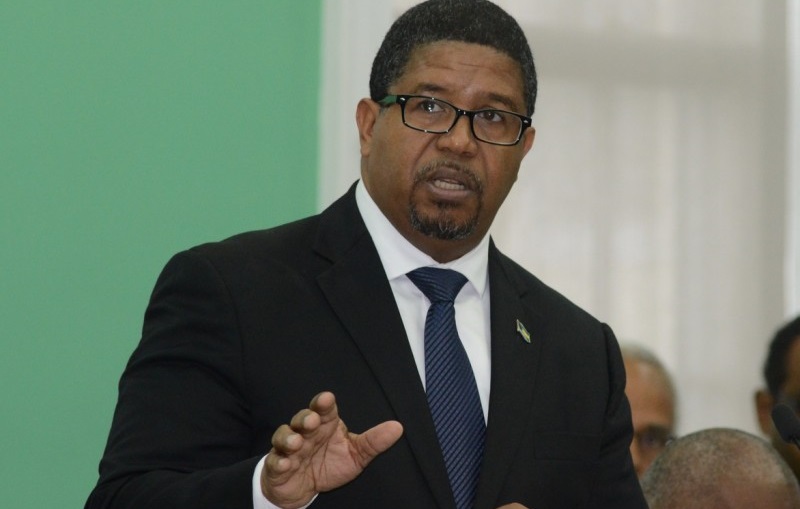#Bahamas, November 18, 2017 – Nassau – Deputy Prime Minister and Minister of Finance the Hon. Peter Turnquest gave details in the House of Assembly of the Government’s recent success at issuing a benchmark US$750 million bond issue, which has been opened to the markets and priced, and is expected to close on November 21, 2017. He made the statement on Wednesday, November 15, 2017.
DPM Turnquest also took the time to set the record straight in response to numerous reports in the Press and social media about the transaction, which characterised it as “lacking in transparency and fiscal prudence.”
“Nothing could be further from the truth. There was absolutely nothing devious, surreptitious or imprudent about this transaction or the manner in which it was handled. There are certain ways these transactions are handled in the international market, and we are appropriately guided by our investors in this regard,” he told the Members of Parliament.
DPM Turnquest explained that all of the Government’s financing activities are conducted within the constraints of its approved borrowing authorities, and shaped and informed by pragmatic debt management strategies.
“These strategies, for example, take into consideration the size and currency composition of the Government’s financing requirements; the identification, analysis and preferences of potential funding sources—whether it is best to source the debt in domestic or foreign currency; and, of course, with due consideration to market liquidity, cost and risk factors.
“To be sure, such analysis and evaluation requires interaction with other agencies—especially our bankers, and most certainly the Central Bank. As is customary, we collaborate very closely with the Central Bank, which manages the issuance of government paper in the domestic market, for advice on domestic liquidity conditions—how much excess loanable funds are in the system, and what is the appetite of the main investors in government paper—the banks and institutional investors (pension funds and the insurance companies) to increasing their holdings.”
He said these factors, including foreign reserves considerations, not only influence the timing and size of potential issues, but also determine decisions on whether borrowings are undertaken in domestic or foreign currency. Such decisions involve serious and considered deliberations by the Government in managing the country’s debt. The DPM noted that during the 2017/18 Budget Communication, two borrowing resolutions were approved by the House.
The first covered the additional funding approval of $400 million to settle the outstanding arrears for FY2016/17 and the second was in respect of FY2017/18, and provided for financing to cover the overall budget deficit, estimated at $322.3 million, and refinancing/debt repayment obligations, which are now projected at $600.2 million.
He said, “Therefore, while the total borrowing envelope under these two approved resolutions totaled approximately $1,322.7 million, the increment to the outstanding debt was and remains $722.3 million, as the $600.2 million in refinancing/debt repayment would have a neutral impact on debt levels.”
DPM Turnquest also noted that it is instructive to mention, that, at the beginning of each Fiscal Year, one of the first things that the Government sets out to do, through its Treasury Department, is to develop monthly cash flow projections—based on how it perceives the evolution of revenue performance and the timing of its outlays.
“These projections are calibrated, on an ongoing basis, to ensure that there are sufficient funds available to meet the Government’s budgetary requirements, as and when needed.
“It is now common knowledge that there were pressing funding needs at the end of the past fiscal year and the outset of the current period, which placed an urgent requirement on policymakers to identify immediate funding sources to meet these obligations.”
He said after an evaluation of the funding options, the Government moved expeditiously to source several short-term bridging facilities, which included US Dollar bank credits ($450 million) and domestic treasury bills and bank advances ($300 million).
“I want to emphasize that these facilities were always contemplated to be short-term in nature, with a subsequent “terming out”, i.e., lengthening of the maturities to achieve a more favourable debt servicing profile. And having considered conditions in the domestic market, and the number of significant rollovers contemplated, the intention was to explore the possibility of rolling up these short-term credits into an international bond issue.”
The bonds, characterized as a 10-Year weighted average life bond, was priced at a coupon or interest rate of 6.00 per cent, which is some 250 basis points above the pricing obtained in the Government’s last bond issuance in 2014 when it enjoyed investment grade credit status.
It is to be repaid in three equal annual installments, commencing on November 21, 2026, and with a final maturity on November 21, 2028. T he 6.00 per cent yield is equivalent to a spread of 362.1 basis points above the US Treasury’s 10-year benchmark bond.
The Deutsche Bank Securities Inc. and RBC Capital Markets, LLC. managed the offer as joint book runners.
By: Llonella Gilbert (BIS)


 News6 days ago
News6 days ago
 Caribbean News7 days ago
Caribbean News7 days ago
 News6 days ago
News6 days ago











